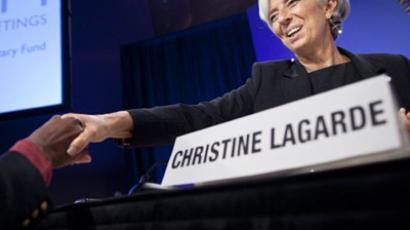Greece burning the bill
It may have secured another €211 from Berlin to help it avoid bankruptcy, but the Greek government’s problems are far from over. It now faces unprecedented hostility from its own people who have point-blank refused the prescribed austerity measures.
Berlin rescues Athens
Greece has become the poster child of the Eurozone debt crisis. Now, with Germany voting to extend the bailout fund, it looks like the country may soon get the cash injection it so desperately needs.But that help has come with strings attached, and here in Greece, the people say that the price they are being made to pay is simply too high.Kicked into action by a market panic unseen since the financial crash of 2008, the German government scrambled to approve a massive expansion of the EU's emergency bailout fund.
The new measures mean Berlin now personally guarantees an astronomical contribution of €211 billion.However, most analysts agree that more must be done to prevent a widely-expected Greek default from shattering the Eurozone.EU negotiators returned to Athens to restart talks on future bailout payments – the government's last chance to evade a collapse later this month.But the fuel for the Greek government's relentless austerity engine seems to be rapidly running out.
Greece boils over
Friday is deadline day for the Greek government's new “special tax”.It is one of the measures the government has put in place to try to secure the next tranche of money the country needs to avoid bankruptcy.The extra tax – which is expected to deduct another three per cent from people's annual income – is supposed to help plug some of the massive budget deficit.But after more than a year of salary cuts and rises in living costs, the people of Greece are already at breaking point. An activist of the “We won’t pay” movement, Errikos Finalis, told RT that “in the last two years almost everybody has lost at least 30 per cent of his salary or his pension.”The opposition member says the movement has expanded rapidly in recent months as more and more people hit the financial wall.“Before, most of the people were not paying because they wanted to protest against an unjust situation. Now, there are thousands and dozens of thousands of people who won't pay because they simply can’t,” Errikos Finalis said.People’s desperation has becoming increasingly evident on the streets of Greece where violence has repeatedly broken out between riot police and protestors.Tuesday night saw even more clashes as parliament voted in yet another in a long line of austerity measures, this time in the form of a new property tax.As one protester who joined a rally near government headquarters explained: “They were organizing all this just to put Greece under IMF – just for political reasons. Greece and Greeks do not need IMF.”Many people in Greece now question just who it is that is in control.
Who rules Eurozone?
“Unfortunately today the real leaders of the Eurozone are the bankers,”believes economist Kiriakos Tobras. “The real leader of the Eurozone is Mr Trichet from the European Central Bank.”“Bankers are not paying, shareholders are not paying. And who has been called on to pay again and again? The citizens and taxpayers of the Eurozone,” the economist concludes.Despite Germany having voted positively to expand the size and power of the European bailout fund, critics are already questioning whether that will be enough.Attention is now turning to the many challenges the Eurozone still faces.“If the problem moves from Greece and starts touching other European countries, than the German banks in the end will suffer a lot. So even Germany that we say is the most healthy economy in the European Union will be affected if the problem is not stopped today, if we don’t find a solution today, not just for Greece but for all the European Union countries,” says Mr. Tobras.With past measures failing to have an effect and as political leaders continue to struggle to convince the public, the future of the Eurozone still hangs in the balance.Protests over strict austerity measures are set to continue, and people in Greece are saying their country is now at risk of having not only a financial but a democratic deficit as well.














